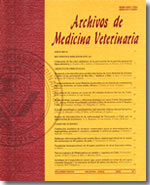Genetic variability of uruguayan creole horse
Main Article Content
Abstract
The Uruguayan Creole Horse corresponds to the biotype of American horse for work, adapted and bred in vast cattle areas. The objective of this work is to study its genetic variability and to establish the differentiation among farms included in the sample with the purpose of analyzing the variability among them.
The study is carried out using 16 genetic markers (7 blood groups and 9 protein polymorphisms), analyzing 145 CHU that corresponds to 4 farms of different regions of the country. The electrophoretic systems tested on the 4 farms (A, B, C, D) were in Hardy-Weinberg equilibrium. The genetic variability in each race was estimated through the average expected heterozygosity (HI) for the 16 genetic markers (GM), the total number of alleles (NA) and the inbreeding coeficient (F). The respective results were: HI= -.424, NA = 62 and F=.049. The variability of each farms was evaluated through the F index and the HI. All the farms showed negative f, the lowest variability was found in B (HI= -.265). The Nei distance was calculated among the 4 farms. Increasing order respect to A was: C (.007), D (.014) and B (.058). A cluster analysis was done through the UPGMA method, obtaining a dendogram in which farms A, C and D are clustered.
It is concluded that the UCH has a genetic variability from intermediate to high, keeping the polimorphism of its ancestral races. On regards to the variability on the farms, it is verified the presence of a line (B) in the race.

